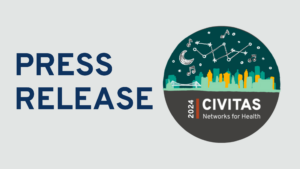The Network for Regional Healthcare Improvement and Strategic Health Information Exchange Collaborative Announce Affiliation; New Organization to be named Civitas Networks for Health
National Leaders in Health Information Exchange and Healthcare Improvement Join Forces to Advance Health Policy Goals and Enhance Healthcare Affordability, Quality, and Equity through Data-Driven Multi-Stakeholder Approaches
Portland, Maine, and Washington, D.C. — The Network for Regional Healthcare Improvement (NRHI) and the Strategic Health Information Exchange Collaborative (SHIEC) announced today a formal affiliation between the two organizations to form a new organization named Civitas Networks for Health. The new organization will serve as a platform for local nonprofit health collaboratives and health information exchanges to grow and thrive. It will offer engagement opportunities and support action at the local, state, and national levels to achieve policy goals for healthcare quality, cost, and equity through data-driven, collaborative, and transformative strategies. The affiliation comes after a one-year due diligence process that will culminate on October 1, 2021, with the organizational launch of Civitas Networks for Health.
NRHI represents regional health improvement collaboratives (RHICs) and state-affiliated partner organizations across the United States. RHICs are nonprofit organizations governed by multi-stakeholder boards that include consumers, healthcare providers, payers, and purchasers of healthcare. They are trusted, neutral conveners that help their local stakeholders identify opportunities and implement strategies that will improve the health and healthcare of their communities.
SHIEC represents statewide, regional, and community health information exchanges (HIEs). SHIEC’s HIE members are nonprofit organizations governed by multi-stakeholder boards and state-designated entities, which manage and provide for the secure digital exchange of health data for hospitals, healthcare providers, and other participants. Its members work to improve care coordination and care management across healthcare systems and communities, enable more informed clinical decisions, and reduce hospital readmissions and other preventable expenditures such as unnecessary or duplicative tests and procedures.
Together, as Civitas Networks for Health, they will become a platform for multi-stakeholder cross-sector health networks and collaboratives to work in partnership with local entities, similar organizations in regions throughout the country, and the federal government to create greater alignment and improve health outcomes. It will be their charge to better harness data and information technology to further clinical insights, increase coordination across the health care system, and develop innovative solutions to some of our most challenging healthcare issues.
The new organization will offer full members, affiliated members, and strategic business and technology partners opportunities for increased collaboration and shared learning; thought leadership and technical expertise on community-level improvements; and education and public advocacy regarding the benefits, functions, and role of HIEs, RHICs, and multidisciplinary organizations.
Civitas Networks for Health will collectively represent 75 regional and statewide HIEs and 19 RHICs. In addition to those full members, they will also encompass 23 HIE and RHIC affiliate members and 55 strategic business and technology members. Their combined footprint will represent 95 percent of the United States, including 45 states and the District of Columbia, with a shared mission of working with local communities to achieve improved health outcomes at a lower cost.
Lisa Bari, MBA, MPH, interim chief executive officer for SHIEC, will serve as interim chief executive officer for the new organization. “As we emerge from the pandemic, there is renewed energy for the role of community health leaders to advance local transformation in line with national goals for healthcare quality, cost, and equity,” commented Ms. Bari. “It will take collaboration with these local organizations to truly transform health and build the trusted relationships that can help us achieve a national interoperability infrastructure. We believe that by bringing providers, purchasers, payers, and patients together to advance data-driven progress and strategies for improved health, we can meet the post-pandemic demand for better systems and structures that support our path to better health.”
Melissa Kotrys, SHIEC Board Chair and CEO of Contexture, noted that the partnership is a logical step for SHIEC. “Building closer ties with NRHI’s regional health improvement collaboratives makes perfect sense,” said Ms. Kotrys. “We believe that, together, we can build a broader network to enhance and inform local, state, and federal health policy issues and private sector solutions, which are built on data, best practices, and trust.
“Each organization brings to the partnership complementary knowledge and expertise critical to transforming the U.S. healthcare system,” said Ana English, NRHI’s Board Chair and president and CEO of Center for Improving Value in Health Care (CIVHC). “NRHI members have experience collecting and reporting on measures of healthcare quality and/or cost, designing initiatives to help healthcare providers and payors improve performance, and working directly with employers and other purchasers to push for value. SHIEC members have trusted data repositories, are experts in connectivity, and serve as problem solvers in their communities. Together we are in a unique position to achieve our goals of improving health and healthcare overall.”
Media Notes: To arrange an interview with a spokesperson for Civitas Networks for Health, please contact Jennifer Devlin at 703-966-3241, or Jim Lubinskas at 703-907-9103, .
About Civitas Networks for Health
Civitas Networks for Health is a national collaborative comprised of member organizations working to use health information exchange, health data, and multi-stakeholder, cross-sector approaches to improve health. Collectively we represent more than 95% of the United States. We educate, promote, and influence both the private sector and policy makers on matters of interoperability, quality, coordination, health equity and cost-effectiveness of healthcare. We support local health innovators by amplifying their voices at the national level and increasing the exchange of valuable resources, tools, and ideas.

